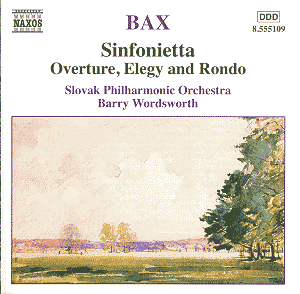Sir Arnold Bax was one of those fortunate souls
who was born with the two essentials for a successful artistic
career: talent and money. Born in a London suburb into a family
of considerable wealth, Baxís mother saw to it that her two sons
were well schooled in lifeís finer things. Arnold became a noted
composer, and his younger brother gained fame as a writer. In
the last couple of decades, Baxís music has seen a bit of a renaissance,
at least on discs, if not in the concert hall, and this is recognition
that is well deserved.
Orchestral music makes up a considerable portion
of Baxís output, with eighty-four works to his credit in that
genre. The two brief pieces presented here are from his middle
maturity and have a number of outstanding features. Perhaps the
most interesting facet of this music is its wide variety of orchestral
color, and the composerís very adept way of exploiting the many
orchestrational possibilities to their fullest and most compelling
effect. The Sinfonietta and the Overture, Elegy and
Rondo have a considerable dramatic flair about them, to the
extent that they are rather reminiscent of classic film music
from the likes of a Franz Waxman, a Bernard Herrmann, or a Miklós
Rósza.
There is much to be praised about these performances,
now more than fifteen years old. Barry Wordsworth coaxes a fine
sense of line and rhythmic drive from the Slovak Philharmonic,
who at the time of these recordings had not yet tasted the full
fruits of a free Eastern Europe. Of especial merit is the tightness
of ensemble and rhythmic clarity of the orchestra, and the warm,
lush sound of the strings. I would be shirking my duty however,
if I failed to point out the consistent tendency of both winds
and brass to play not only just a tad under the pitch, but to
fail on several key accounts to even play well in tune amongst
themselves. It is particularly noticeable after passages involving
the winds alone. When the strings come in again, the intonation
discrepancies make one cringe.
That quibble aside, these are well-structured
performances and the music itself is a delight. Had I have purchased
the original Marco Polo full-price issue, I might have felt a
bit slighted by the skimpy amount of music on the disc, but at
the Naxos price, I can even forgive the brevity. Sound quality
is perfectly acceptable, if not of the quality of say, Ray Minshull
or John Culshaw. Lewis Foremanís program notes are informative
and interesting without going overboard on the analysis and blow-by-blow
description.
This disc is by all means worthy and it is a
good thing to see some of Marco Poloís esoterica turning up under
the less pricey Naxos canopy. Recommended with a slight hedge
for the intonation issues mentioned above.
see also review
by Rob Barnett
Kevin Sutton
